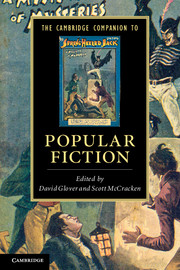Book contents
- Frontmatter
- Introduction
- 1 Publishing, history, genre
- 2 Fiction, theatre and early cinema
- 3 Television and serial fictions
- 4 The public sphere, popular culture and the true meaning of the zombie apocalypse
- 5 The reader of popular fiction
- 6 Reading time: popular fiction and the everyday
- 7 Gender and sexuality in popular fiction
- 8 Pulp sensations
- 9 Bestselling fiction: machinery, economy, excess
- 10 Comic books and graphic novels
- 11 Popular fiction in the digital age
- Further reading
- Index
- Cambridge Companions to …
3 - Television and serial fictions
Published online by Cambridge University Press: 28 May 2012
- Frontmatter
- Introduction
- 1 Publishing, history, genre
- 2 Fiction, theatre and early cinema
- 3 Television and serial fictions
- 4 The public sphere, popular culture and the true meaning of the zombie apocalypse
- 5 The reader of popular fiction
- 6 Reading time: popular fiction and the everyday
- 7 Gender and sexuality in popular fiction
- 8 Pulp sensations
- 9 Bestselling fiction: machinery, economy, excess
- 10 Comic books and graphic novels
- 11 Popular fiction in the digital age
- Further reading
- Index
- Cambridge Companions to …
Summary
Written in 1974, Raymond Williams's Television: Technology and Cultural Form was to become for many academics, and particularly for academics who approached popular culture from the perspective of the humanities, one of the foundational texts of the study of television, the first and even the only book on reading lists, the book which introduced the concept of ‘flow’ as a way of identifying ‘the defining characteristic of broadcasting’. While, almost forty years later, many of its formulations have worn thin with over-use, Williams's observation on the centrality of televisual dramatic fiction to modern experience still has the force of defamiliarisation: it is still surprising to consider, as if for the first time, how much of our time is spent with, how many of our references are drawn from, or how much the structure of contemporary feeling is shaped by television dramatic fiction in its various forms. ‘It seems probable’, says Williams,
that in societies like Britain and the United States more drama is watched in a week or a weekend, by the majority of viewers, than would have been watched in a year or in some cases a lifetime in any previous historical period. It is not uncommon for the majority of viewers to see, regularly, as much as two or three hours of drama, of various kinds, every day. The implications of this have scarcely begun to be considered. It is clearly one of the unique characteristics of advanced industrial societies that drama as an experience is now an intrinsic part of everyday life, at a quantitative level which is so very much greater than any precedent as to see a fundamental qualitative change. Whatever the social and cultural reasons may finally be, it is clear that watching dramatic simulation of a wide range of experiences is now an essential part of our modern cultural pattern. Or, to put it categorically, most people spend more time watching various kinds of drama than in preparing and eating food.
- Type
- Chapter
- Information
- The Cambridge Companion to Popular Fiction , pp. 50 - 67Publisher: Cambridge University PressPrint publication year: 2012
- 2
- Cited by



